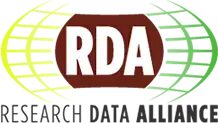Research Data Alliance
The Research Data Alliance (RDA) is a research community organization started in 2013 by the European Commission, the American National Science Foundation and National Institute of Standards and Technology, and the Australian Department of Innovation. Its mission is to build the social and technical bridges to enable open sharing of data.[2] The RDA vision is researchers and innovators openly sharing data across technologies, disciplines, and countries to address the grand challenges of society.[2] The RDA is a major recipient of support in the form of grants from its constituent members' governments.[8][9]
 | |
| Abbreviation | RDA |
|---|---|
| Motto | Research data sharing without barriers |
| Formation | March 2013 |
| Founder | European Commission, United States National Science Foundation, United States National Institute of Standards and Technology, Australia Department of Innovation[1] |
| Type | Non-profit NGO |
| Purpose | Building the social and technical bridges to enable open data sharing[2] |
Membership | 7,746[3] |
| Hilary Hanahoe[4] | |
Advisory Council Chair | Fran Berman[5] |
Co-chairs, Technical Advisory Board | Françoise Genova, Paul Uhlir[6] |
Co-chairs, Organisational Advisory Board | Amy Nurnberger, Kevin Ashley[7] |
| Website | www |
As of August 2019, the RDA has over 8,800 individual members from 137 countries.[10]
Structure
The RDA's main vehicle for outputs are 18-month long working groups that generate recommendations aimed at the RDA community. In addition to working groups, interest groups with no fixed lifetime can produce either informal or "supported" outputs which carry some degree of RDA endorsement.
Meetings
The RDA organises two major plenary conferences a year that are often co-located within other international data sharing initiatives such as the 12th RDA plenary being part of "International Data Week, 2018" in Gaborone, co-organised by RDA, the ICSU World Data System (WDS), the ICSU Committee on Data for Science and Technology (CODATA), University of Botswana (UoB) and the Academy of Science of South Africa (ASSAf).[11] RDA aims to spread the plenary meetings across many of its members' locales with recent plenaries being held in Philadelphia, Berlin, Montréal, Barcelona, Denver, Tokyo, Paris, San Diego, Amsterdam, Dublin, Washington DC and Gothenburg, Sweden.[12]
Partnerships
The RDA provides national data sharing organisations, such as the Australian National Data Service (ANDS), an "influence over the kinds of data sharing environments that Australian researchers will work with when they collaborate with international colleagues".[13] The RDA is partnered with many major international data initiatives such as DataCite[14] and frequently forms joint working groups with them, such as with the World Data System.[15]
References
- "RDA for Newcomers". Research Data Alliance. Retrieved January 22, 2019.
- Research Data Alliance (2018) "About RDA". Web Page. Accessed 2018-04-27
- "Membership". Research Data Alliance. Retrieved January 22, 2019.
- "Secretariat". Research Data Alliance. Retrieved January 22, 2019.
- "Council". Research Data Alliance. Retrieved January 22, 2019.
- "Technical Advisory Board". Research Data Alliance. Retrieved January 22, 2019.
- "Organisational Advisory Board". Research Data Alliance. Retrieved January 22, 2019.
- "Research Data Alliance/US To Expand Reach and Scope With $5 Million NSF Grant". Rensselear Polytechnic Institute. 2013. Retrieved April 9, 2016.
- "RDA Europe 4.0". European Commission. 2018. Retrieved April 27, 2018.
- Research Data Alliance (2019) "About RDA?". Web Page. Accessed 2018-08-06
- International Data Week committee (2018). "About IDW 2018". Retrieved April 27, 2018.
- Research Data Alliance (2018). "Plenaries". Retrieved April 27, 2018.
- Australian National Data Service (2016). "Research Data Alliance - Why is ANDS involved with the RDA?". Retrieved April 9, 2016.
- DataCite (2016). "RDA - Research Data Alliance". Retrieved April 9, 2016.
- ICSU-WDS (2013). "RDA–WDS Interest Groups Initiated". Retrieved April 9, 2016.